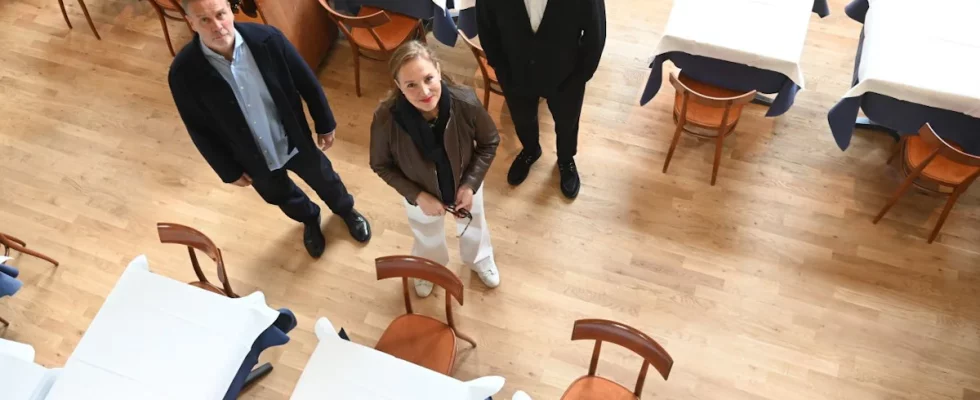Constant drops, as the saying goes, often have unexpected effects. In the case of the Brasserie Oskar Maria in the Literaturhaus on Salvatorplatz, it was the dishwasher connection at the bar that wasn’t completely tight. He released water drop by drop, apparently over a long period of time. And at some point the glass door that separates the Literaturhaus from its brasserie no longer closed properly: the wooden parquet had lifted and swelled. “We then discovered,” says Uli Springer, one of the three brasserie operators, “that the floor in the entire restaurant had become damp, right down to the screed. And you could already see mold forming on the wall behind the bar.”
This is also the reason why the new Ingeborg Bachmann exhibition in the gallery, which is located on the ground floor of the building, can only open on Monday evening, fourteen days late. Repairing the water damage took more than three months, “and of course that also affected us,” says Tanja Graf, the head of the literature house. But now she is happy again with her completely renovated property. “Munich’s first opera house once stood here, then it was a market hall and a school,” she says, “and now we have exchange, education and culture combined here again. That’s nice!”
This Saturday, poetry is no longer without a living, because the brasserie is opening again. For the operators Uli Springer, Dino Klemencic and Marc Ueblherr, this will be a bit of a jump into the deep end. Because the long night of music takes place on the first day. The swing combo traditionally plays at Oskar Maria The Upstroke Five & Collectif Django, and the hut is usually so full that the audience waits in line outside. Dino Klemencic is therefore excited to see how the restart will turn out.
“We continued to pay all of our 45 employees during the closure,” he reports, “and almost all of them are back.” But whether the temporary workers stay on board is another question. For service staff, tips usually make up a third to half of their income, “of course that goes away when the restaurant is closed.” However, given the current shortage of staff in the catering industry, you can choose your jobs.
And even though there are well-heeled customers in the financial district, at least during the day, Oskar Maria doesn’t necessarily have an easy time because it’s open every day, from morning until late at night. The audience is very mixed, from business people during the day to cultural audiences of all ages in the evening. “The Literaturhaus is like a stage,” says Uli Springer, “with a very diverse program and a really great, mixed audience.” But also many regular guests. “During the day that’s around 60 percent,” says Klemencic.
They will immediately recognize your restaurant on Saturday. Because even if the floor and bar were almost completely renewed: the monument protection and the copyright claim of the architectural firm Uwe Kiessler, which carried out the conversion of the former Salvatorschule in the 1990s, hardly allows any major changes. Which is fine, because the restaurant itself, with its hanging gallery and the staircase leading up, is of timeless beauty.
The changes relate more to the offer. “The classic brasserie cuisine is no longer in great demand,” says Klemencic, “the daily crowd has high quality standards and little time.” Uli Springer estimates that around 40 percent of the dishes are now vegetarian and vegan. This shouldn’t be due to the authors, who are now finally getting something to eat in the house again, if one can believe the Literaturhaus spokeswoman Marion Bösker: “Many who read with us again and again say that they are looking forward to the beef tartare in the Oskar Maria afterwards.”

